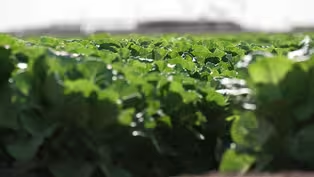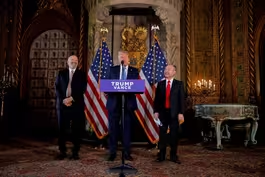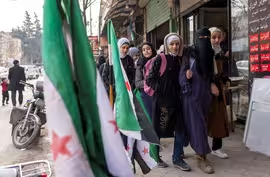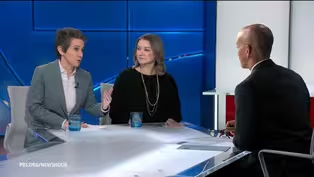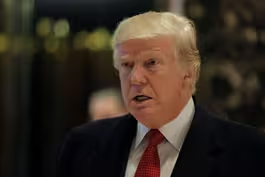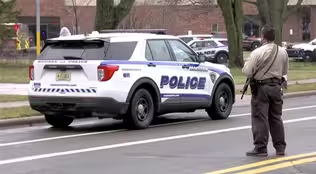
City home to Syria's uprising celebrates life without Assad
Clip: 12/16/2024 | 6m 53sVideo has Closed Captions
City that fostered Syria's uprising celebrates life without Assad
In 2011, as the Arab Spring took hold across the Middle East, the seeds of Syria's revolution were sown by students and young people in the city of Daraa. Special correspondent Simona Foltyn reports on how the city that fostered the uprising is celebrating the deposing of former Syrian President Bashar al-Assad.
Problems playing video? | Closed Captioning Feedback
Problems playing video? | Closed Captioning Feedback
Major corporate funding for the PBS News Hour is provided by BDO, BNSF, Consumer Cellular, American Cruise Lines, and Raymond James. Funding for the PBS NewsHour Weekend is provided by...

City home to Syria's uprising celebrates life without Assad
Clip: 12/16/2024 | 6m 53sVideo has Closed Captions
In 2011, as the Arab Spring took hold across the Middle East, the seeds of Syria's revolution were sown by students and young people in the city of Daraa. Special correspondent Simona Foltyn reports on how the city that fostered the uprising is celebrating the deposing of former Syrian President Bashar al-Assad.
Problems playing video? | Closed Captioning Feedback
How to Watch PBS News Hour
PBS News Hour is available to stream on pbs.org and the free PBS App, available on iPhone, Apple TV, Android TV, Android smartphones, Amazon Fire TV, Amazon Fire Tablet, Roku, Samsung Smart TV, and Vizio.
Providing Support for PBS.org
Learn Moreabout PBS online sponsorshipAMNA NAWAZ: For the first time since he fled the country he had ruled with an iron fist and a willingness to kill his own people to stay in power, former Syrian President Bashar al-Assad was heard from today.
In a statement from exile in Moscow, Assad said -- quote -- "at no point" did he consider stepping down or seeking refuge, but said he was evacuated from Syria by Russian forces after he left Damascus for his family's hometown near Syria's coast.
GEOFF BENNETT: Assad also said that the country has, in his words, fallen into the hands of terrorism.
That's a reference to the forces that led the lightning campaign that marked a new chapter in Syria's rebellion and now apparently leads that devastated nation.
But the seeds of that revolution were sown just to the south of Damascus in the city of Daraa by students and young people back in 2011 as the Arab Spring took hold across the Middle East.
Special correspondent Simona Foltyn reports now on how the city that fostered uprising now celebrates the deposing of a dictator.
SIMONA FOLTYN: This is where it all began, the writing on the wall that sparked a revolution.
In early 2011, Mouawiya Syasneh, then a 15-year-old student, scribbled a prophecy on the walls of his school in the southern city of Daraa.
MOUAWIYA SYASNEH, Opposition Fighter (through translator): The first wall we wrote on was here.
We wrote "Down with the regime" and "Freedom."
And on that wall over there, we wrote, "It's your turn, Doctor."
SIMONA FOLTYN: The title doctor referred to Assad, an ophthalmologist.
The graffiti, sprayed on both the school's inner and outer walls, was an unimaginable act of protest in Assad's repressive Syria.
MOUAWIYA SYASNEH (through translator): When we were little, our parents used to tell us, don't speak about politics.
The walls have ears.
SIMONA FOLTYN: But Mouawiya and his friends had been inspired by the Arab Spring.
Strongmen had already fallen in Egypt and Tunisia.
Little did they know that they'd be the ones to predict, albeit much later, Assad's overthrow.
MOUAWIYA SYASNEH (through translator): We didn't think it would lead to this.
We were watching the protests in Tunisia, the freedom that the regime had fallen.
So we wrote, "It's your turn, Doctor," on our school walls.
But we didn't expect it to erupt this way.
SIMONA FOLTYN: The graffiti was quickly erased by authorities, the pupils arrested and tortured.
MOUAWIYA SYASNEH (through translator): I was in prison for 45 days.
There were a lot of different types of torture, beating, electrocution, any kind of abuse you can think of.
We were tortured a lot.
SIMONA FOLTYN: It was the government's cruel treatment that fueled the anger across Syria, exploding into calls for systemic change.
After his release, Mouawiya went on to join the armed opposition.
MOUAWIYA SYASNEH (through translator): We want security and safety to return to Syria and that we rebuild it with our hands.
We defended our land, our country, our honor for 14 years, and thank God we remain steadfast and prevailed.
SIMONA FOLTYN: Now, students in Daraa can flood the streets without fear of arrest and torture.
The city of Daraa is where the Syrian uprising began.
And, today, people are once again protesting, but not against the new government.
They're enjoying their newly found freedom of expression and they're celebrating the overthrow of Bashar al-Assad's regime.
AHMED AL HIRAQI, Protester (through translator): This is a protest of victory.
We got rid of the tyranny of Bashar al-Assad, the pig.
Thank God we got rid of him and life has returned.
And, God willing, Syria will be rebuilt.
SIMONA FOLTYN: For the first time in their lives, they can stand freely in their squares and raise their voices.
AHMED AL HIRAQI (through translator): Now life is great.
Before, you would go to Damascus.
You were afraid.
You would go to Daraa, you were afraid.
Our country was condemned.
Now we can go anywhere we want.
SIMONA FOLTYN: And that's exactly what they do.
Public squares are brimming with all that was suppressed for decades, the voice of justice getting louder as they chant.
Many approached us, wanting their opinions heard, keen to speak for the first time with Western television.
Mohammed is an economic student at the university here.
He looks forward to finally leading a normal student life.
MOHAMMED NASSER AL MASALMEH, University Student (through translator): Our ambition was to wield a degree, that our weapons would be knowledge and the pen.
We didn't want to bear arms and fight, but this regime forced us to do that by arresting and killing innocent people and children.
SIMONA FOLTYN: In the mosque from where the first protest emerged in 2011, rebel leaders gather for a prayer.
Yassin Al-Nassan is a commander in one of the many rebel factions that emerged to fight Assad's brutal crackdown.
He has just returned from Idlib after years of exile from Daraa.
YASSIN AL-NASSAN, Faction Commander (through translator): We went to Idlib after big pressure on us to evict us from this land.
We wouldn't have left otherwise, but we started to organize ourselves and to prepare ourselves for the return to our land.
SIMONA FOLTYN: Yassin Al-Nassan left Daraa in 2018 as part of an ultimatum: Stay and lay down your arms or transfer to the northern province of Idlib.
What may have looked like a defeat at that time became an opportunity that paved the road to victory.
The factions united under the leadership of Hay'at Tahrir al-Sham, or HTS, the leading armed opposition group that controlled Idlib before it launched its surprise offensive earlier this month.
YASSIN AL-NASSAN (through translator): The offensive was a surprise for others, but not for us in the north.
We were waiting for it to start, but we chose the right time.
SIMONA FOLTYN: Now all the factions will become part of the Ministry of Defense.
YASSIN AL-NASSAN (through translator): There are no more factions.
There will be a proper organized army which will incorporate those who volunteered to defend this country, and we will finish with the factionalism and chaos.
SIMONA FOLTYN: Indeed, the power struggles that weakened the opposition in the past appear to have diminished.
Inside the city's main government complex, fighters from the south and north mingle with one another.
ANAS AL MAHAMED, Faction Commander (through translator): Yesterday, the guys from the north came and we merged with them.
And now we work together.
SIMONA FOLTYN: Anas Al Mahamed is from Daraa and the commander in another rebel group.
He appears to recognize the leadership of HTS.
ANAS AL MAHAMED (through translator): We tried many times to overthrow the government, but we didn't have the capabilities here, neither the weaponry nor the organizational capabilities, so that we could achieve what our brothers and sisters achieved in the north.
Our people in the north had enough time to train and prepare for this powerful work.
SIMONA FOLTYN: It remains to be seen how long this unity will last.
But, in Daraa, where the uprising began almost 14 years ago, there's a firm desire to put down the guns for good.
For the "PBS News Hour," I'm Simona Foltyn in Daraa, Syria.
Arizona farmers forced to adapt as water source dries up
Video has Closed Captions
Clip: 12/16/2024 | 6m 25s | Arizona farmers forced to adapt as main water source dries up (6m 25s)
How CEOs are trying to gain favor with Trump
Video has Closed Captions
Clip: 12/16/2024 | 5m 40s | How CEOs of major companies are trying to gain favor with Trump (5m 40s)
Syrian leaders face decisions as they chart path for country
Video has Closed Captions
Clip: 12/16/2024 | 4m 54s | Syria's rebel leaders face critical decisions as they chart new path for the country (4m 54s)
Tamara Keith and Amy Walter on Trump preparing for Day 1
Video has Closed Captions
Clip: 12/16/2024 | 10m 17s | Tamara Keith and Amy Walter on how Trump's team is preparing for his Day 1 agenda (10m 17s)
Trump settlement with ABC raises press freedom concerns
Video has Closed Captions
Clip: 12/16/2024 | 7m 22s | ABC News settlement with Trump raises concerns about press freedom in his 2nd term (7m 22s)
Wisconsin shooting leaves community shaken by gun violence
Video has Closed Captions
Clip: 12/16/2024 | 2m 52s | Wisconsin school shooting leaves another American community shaken by gun violence (2m 52s)
Providing Support for PBS.org
Learn Moreabout PBS online sponsorship
- News and Public Affairs

FRONTLINE is investigative journalism that questions, explains and changes our world.

- News and Public Affairs

Amanpour and Company features conversations with leaders and decision makers.












Support for PBS provided by:
Major corporate funding for the PBS News Hour is provided by BDO, BNSF, Consumer Cellular, American Cruise Lines, and Raymond James. Funding for the PBS NewsHour Weekend is provided by...
